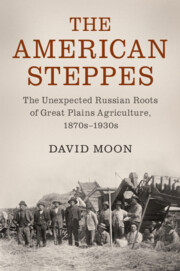Book contents
- The American Steppes
- Studies in Environment and History
- The American Steppes
- Copyright page
- Dedication
- Epigraph
- Contents
- Figures, Maps, and Tables
- Preface
- Acknowledgements
- Notes on the Text
- Dramatis Personae
- Abbreviations
- Maps
- Introduction
- Part I Contexts
- Part II Transfers
- Chapter 4 Wheat
- Chapter 5 Soil Science I
- Chapter 6 Soil Science II
- Chapter 7 Shelterbelts I
- Chapter 8 Shelterbelts II
- Chapter 9 Tumbleweed
- Conclusion
- Archival Collections Cited
- Index
Chapter 6 - Soil Science II
from Part II - Transfers
Published online by Cambridge University Press: 23 March 2020
- The American Steppes
- Studies in Environment and History
- The American Steppes
- Copyright page
- Dedication
- Epigraph
- Contents
- Figures, Maps, and Tables
- Preface
- Acknowledgements
- Notes on the Text
- Dramatis Personae
- Abbreviations
- Maps
- Introduction
- Part I Contexts
- Part II Transfers
- Chapter 4 Wheat
- Chapter 5 Soil Science I
- Chapter 6 Soil Science II
- Chapter 7 Shelterbelts I
- Chapter 8 Shelterbelts II
- Chapter 9 Tumbleweed
- Conclusion
- Archival Collections Cited
- Index
Summary
This chapter surveys the dissemination of the Russian innovation in soil science in the United States. The chief architect of a “Russian revolution” in US government soil science was Curtis Marbut, who headed the US Soil Survey from 1910 until 1934. Marbut became convinced by the Russian science after reading a book by Russian scientist Konstantin Glinka published in German in 1914. Marbut tested the Russian approach in the Great Plains. He worked hard to persuade workers in the US Soil Survey of the need to change the methodology. Marbut had succeeded by the late 1920s. He was assisted by two Russian émigrés – soil scientists, Jacob Joffe and Constantine Nikiforoff. Links between American and Soviet soil scientists were cemented at two scientific Congresses, in the United States and the Soviet Union, in 1927 and 1930. By the 1930s, US soil maps designated the soils of the Great Plains “Chernozems,” using the Russian term.
Keywords
- Type
- Chapter
- Information
- The American SteppesThe Unexpected Russian Roots of Great Plains Agriculture, 1870s–1930s, pp. 226 - 276Publisher: Cambridge University PressPrint publication year: 2020

